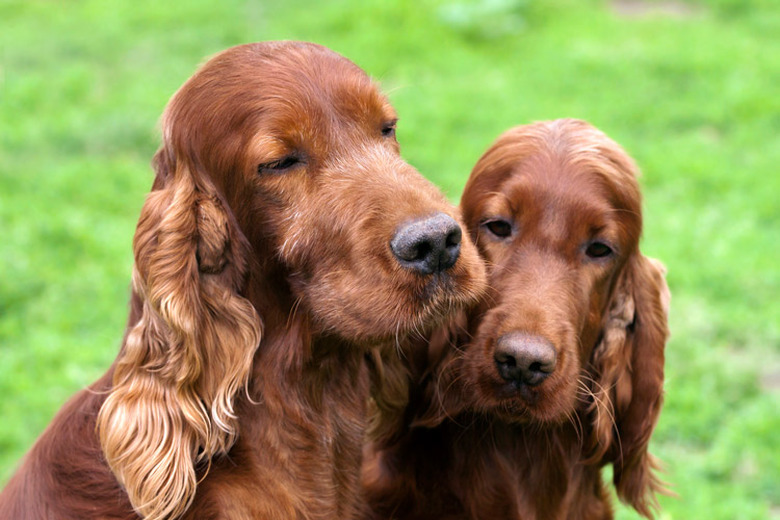Do Dogs Recognize Their Grown Offspring?
We may receive a commission on purchases made from links.
A misconception exists that dogs don't recognize their offspring later in life. According to Steven Lindsay, a dog behavior consultant and trainer, canine parents can share bonds with their litters that last a lifetime, provided conditions are stable in the first weeks after giving birth.
Canine Social Intelligence
In an interview for CNN, Brian Hare of the Canine Cognition Center said dogs have a highly attuned social intelligence. He notes that their capacity to understand the gestures and expressions of other species, particularly humans, has for more than 12,000 years secured dogs a place in civilization. This human factor fundamentally altered their social-structure and hierarchy. The life cycle of a dog no longer resembles that of a wolf in the wild, whose close-knit family unit provides security from natural enemies. Yet, instinct ensures certain constants remain — one of these being the need to preserve one's offspring, another being the need to reproduce outside of one's gene pool. Mother Nature, to these ends, has provided a means for domesticated dogs to recognize their young despite human-imposed limits on their freedom.
Biochemical Warm Fuzzies
Dogs can recognize their pups even after many intervening years, but it has little to do with memory as people think of it. Wolf pups tend to stay with their parents for the first three years of life, but domesticated dogs rarely get this opportunity. Further, a dog's long-term memory is not as developed as it is in humans. The bond a bitch and her pups form depends on a biochemical process commonly known as imprinting. The "love hormone" oxytocin is an essential player. If a dog is allowed a proper formative period with her pups — up to four months — the likelihood they'll form a lasting bond is virtually guaranteed, says Steven Lindsay. Lindsay suggests imprinting makes scent and appearance physiological triggers, promoting a sense of familiarity after maternal instinct has faded. The more positive a formative experience, especially by the critical eighth week of the pups' lives, the stronger the imprint and thus the bond.
Unhappy Families
Canine dysfunction are usually traced to formative years. If pups are weaned from their mother too early or inhabit a chaotic environment, their ability to bond might be impaired. In such situations the question of whether or not the bitch and her whelps will know each other in the future will be the least of your problems. Lindsay says traumas experienced during early life cause aggressive, antisocial behavior in adulthood. In harsh-enough conditions, such as predatory threat or prospect of starvation, mothers have been known to kill their young.
Picnics at the Dog Park
Should you ever play a part in raising a litter, feel honored. Enrich the experience by promoting socialization and undertaking training. You'll feel good knowing you've helped give them a better chance at happy, healthy lives no matter where they make their homes. If and when your parent dogs reunite with one another, they should remember one another — not that they'll make that clear to you or that they'll remember immediately.
By Christopher F. Lapinel
References
All Dogs Gym & Inn: Dogs' Social Hierarchy & Pack Behavior
CNN Living: Inside The Science Of How Dogs Think
Handbook Of Applied Dog Behavior And Training, Vol. 1: Adaptation And Learning; Steven R. Lindsay
PBS NOVA: The Truth About Dogs
Pet Advisor: Do Dogs Think About Their Parents, Or Their Brothers And Sisters?
About the Author
Christopher F. Lapinel is an artist and freelance writer with work appearing in several publications. He is also the co-owner of a holistic dog-training service in San Diego. Lapinel holds a master's degree in creative writing from the University of St. Andrews and taught English at LaGuardia Community College.
